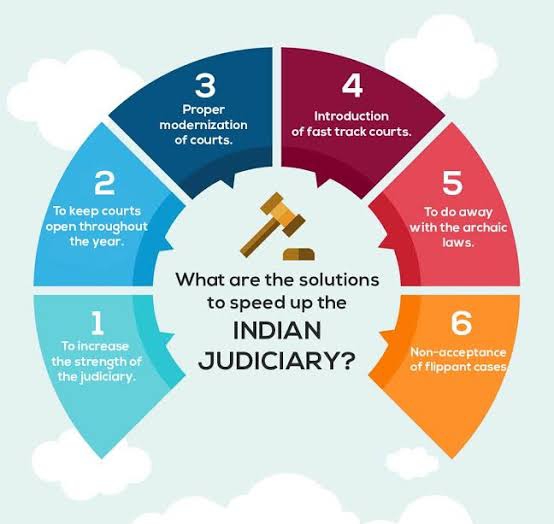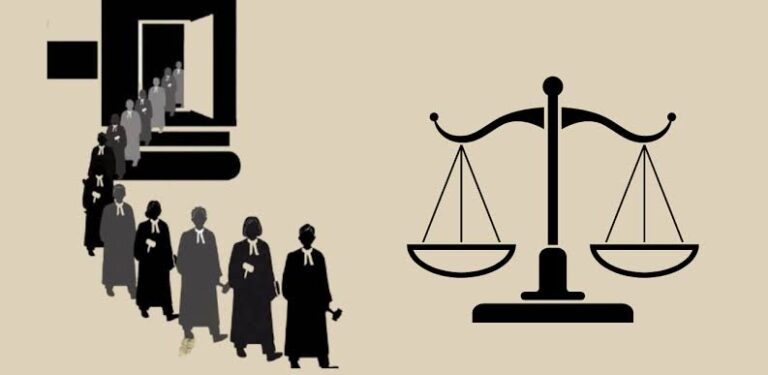Litigants Facing Challenges Due to Lack of Judicial Accountability in India
Introduction:
The Indian judiciary is often hailed as the guardian of justice, responsible for upholding the rule of law and ensuring the protection of citizens’ rights. However, over the years, concerns have been raised about the lack of judicial accountability and its impact on litigants. This article delves into the challenges faced by litigants in India due to the absence of robust judicial accountability mechanisms.
Understanding Judicial Accountability:
Judicial accountability refers to the obligation of judges to act transparently, fairly, and in accordance with established legal principles. It ensures that the judiciary's decisions are unbiased, consistent, and free from any external influence. Accountability fosters public trust in the judicial system and provides an avenue for litigants to seek redress in case of grievances.
Challenges Faced by Litigants:
1.Delay in Justice: One of the most significant challenges faced by litigants in India is the inordinate delay in the disposal of cases. The lack of judicial accountability often results in a backlog of cases, causing litigants to wait for years, if not decades, for their cases to be resolved. This delay not only hampers access to justice but also affects the litigants’ lives, particularly in matters of personal disputes, property rights, and employment issues.
Bhopal gas tragedy case
The disaster occurred in 1984, yet the legal proceedings took several years to conclude, resulting in frustration over the delayed justice for the victims and their families. This case highlights the challenges of the Indian legal system in providing timely resolution to complex cases.
Pallavi Purkayastha murder case
He was traced with the help of the Jammu and Kashmir recruited informers. The verdict, in this case, was also delayed, and justice was not even granted because the person who was required to serve the jail term ultimately escaped and is still absconding.
2.Inconsistent Decisions: The absence of a mechanism to ensure consistency in judicial decisions can lead to confusion and uncertainty among litigants. Different benches of the same court may interpret laws differently, creating a lack of predictability in legal outcomes. This inconsistency undermines the trust of litigants in the judicial system and leaves them grappling with ambiguity.
Zakia Ahsan Jafri vs State of Gujarat and another
It was a special leave petition (SLP), filed by Zakia Ahsan Jafri and Teesta Setalvad against the judgment and order passed by the Gujarat high court. The inclusion of Setalvad as a petitioner was objected to by the respondents and the court agreed to drop her as a petitioner.
3.Burdensome Costs: Legal proceedings in India can be financially draining for litigants. The lack of accountability can result in unnecessary adjournments, protracted proceedings, and needless litigation, increasing the financial burden on litigants. Many individuals, especially those from marginalized backgrounds, find it difficult to navigate the legal system’s complexities and bear the associated costs.
Mohammed Haroon vs. Union of India
In this case, the Supreme Court recognized the importance of access to justice and directed the government to take measures to reduce the financial burden on litigants, including providing legal aid and simplifying procedures.
4.Limited Remedies for Judicial Misconduct: Instances of judicial misconduct or bias are rare but can have profound implications for litigants. The existing mechanisms to address such issues, like the process of impeachment, are cumbersome and rarely invoked. This lack of effective remedies for judicial misconduct leaves litigants without recourse if they encounter biased or unethical behavior from judges.
CBI vs. Justice C.S. Karnan
Justice C.S. Karnan, a former judge of the Calcutta High Court, was accused of making serious allegations against fellow judges and engaging in various acts of misconduct.
5.Transparency and Accountability: While transparency is a cornerstone of accountability, the Indian judiciary’s proceedings are often shrouded in secrecy. The lack of mechanisms to hold judges accountable for their decisions or actions erodes public faith in the judiciary. Litigants are left without a means to challenge decisions that may appear arbitrary or unjust.
Jessica Lal murder case
In this case, due to influential defendants, there were allegations of manipulation of evidence, intimidation of witnesses, and lack of proper investigation. This highlighted the challenges litigants face when the judicial system lacks transparency and accountability, leading to concerns about fair trials and justice being compromised.
Possible Solutions:

1.To increase the strength of the judiciary
Increasing the strength of the judiciary involves measures such as enhancing the number of judges to reduce backlogs, improving infrastructure, implementing transparent appointments, and ensuring judicial independence to uphold the rule of law effectively.
2.To keep courts open throughout the year
Keeping the court open throughout the year is crucial for ensuring timely justice delivery. This approach can help reduce case backlogs, expedite legal proceedings, and provide citizens with access to justice without unnecessary delays. However, it requires efficient scheduling, adequate resources, and support for judges and court staff to maintain a consistent and effective judicial process.
3.Proper modernization of courts
Proper modernization of courts involves adopting technological advancements to streamline and enhance the judicial system. This includes digitizing case records, implementing e-filing systems, video conferencing for hearings, and online access to legal information. Such modernization can lead to increased efficiency, reduced paperwork, and improved accessibility for both legal professionals and the public, ultimately contributing to a more effective and transparent justice system.
4.Introduction of fast track courts
Fast track courts are specialized judicial forums established to expedite the resolution of certain types of cases, typically focusing on matters requiring swift justice, such as cases involving women, children, or senior citizens, as well as certain criminal offenses. These courts aim to reduce case backlogs, provide quicker verdicts, and ensure timely justice delivery. By prioritizing these cases and employing streamlined procedures, fast track courts contribute to a more efficient and responsive legal system.
5.To do away with the archaic laws
Doing away with archaic laws is essential to ensure that the legal system remains relevant and just. These laws, often outdated and no longer applicable in contemporary society, can create confusion, injustice, and hinder progress. Repealing or amending such laws requires a careful review process, involving legal experts, policymakers, and public input. By eliminating archaic laws, the legal framework can better reflect current social norms, technological advancements, and evolving values, leading to a more equitable and effective legal system.
6.Non-acceptance of flippant cases
Non-acceptance of flippant cases is a practice where courts refuse to entertain frivolous or trivial lawsuits. This approach is crucial to maintain the efficiency and integrity of the judicial system. By dismissing cases that lack genuine legal merit or are filed without due diligence, the courts can focus their resources on addressing legitimate disputes and ensuring that justice is served in a meaningful and responsible manner. This also helps prevent the misuse of the legal process and promotes a more effective administration of justice.
Conclusion:
The lack of judicial accountability in India poses significant challenges for litigants, impacting their access to justice, financial well-being, and trust in the legal system. Addressing these challenges requires a concerted effort from all stakeholders, including the judiciary, the legal fraternity, and policymakers. By implementing transparent mechanisms, improving judicial performance, and enhancing technology integration, India can work towards a more accountable and efficient judicial system that serves the interests of all its citizens.

